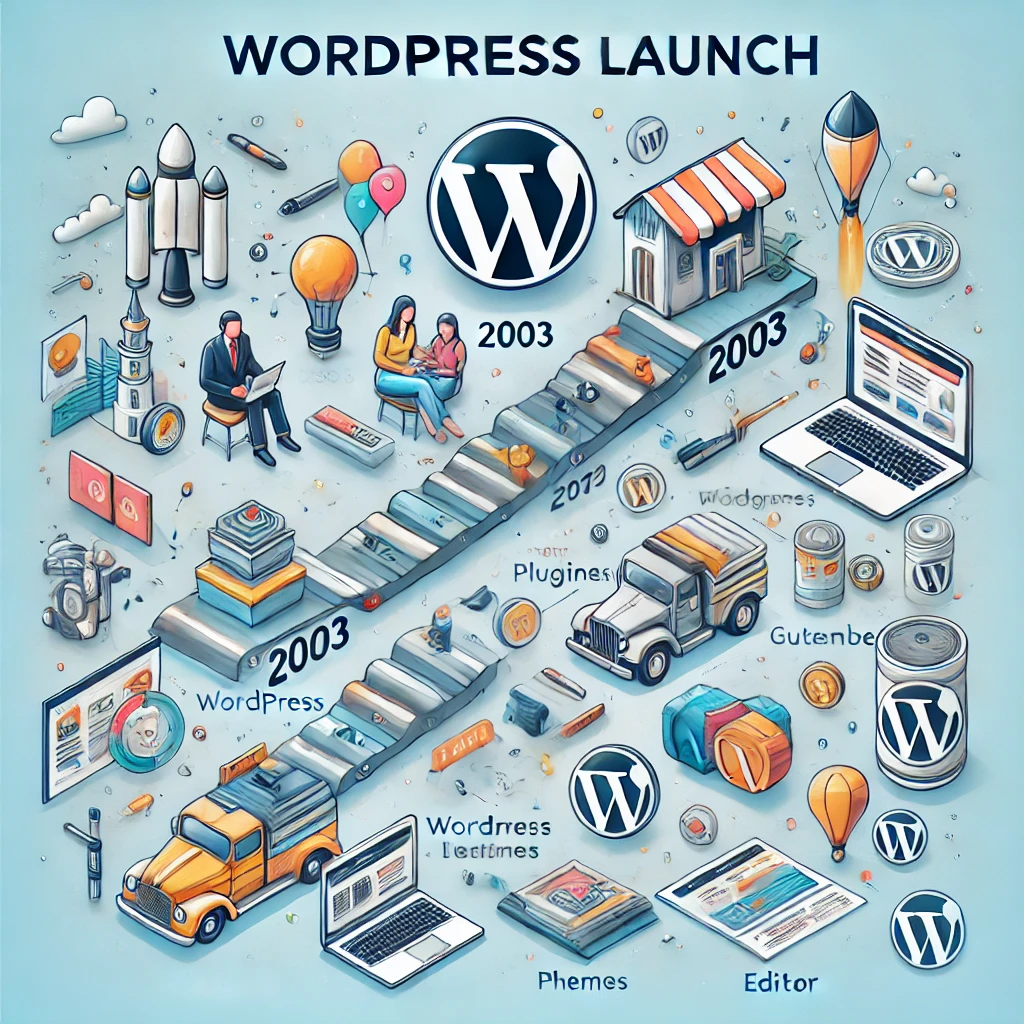WordPress has revolutionized the world of website creation, empowering millions of users to build and manage their online presence with ease. But when did this powerful platform first come into existence? In this post, we explore the history of WordPress, its launch date, and its evolution into the world’s most popular content management system (CMS).
Introduction: The Birth of WordPress
WordPress is synonymous with simplicity and flexibility in web development. Whether you’re a blogger, business owner, or developer, WordPress has likely played a role in your digital journey. But understanding its origins sheds light on how it became a global phenomenon.
Key Date: WordPress officially launched on May 27, 2003.
WordPress Basics: The Early Days
1. The Founders
WordPress was founded by Matt Mullenweg and Mike Little, who envisioned a user-friendly, open-source platform for creating websites. Their collaboration began as an effort to improve an existing blogging software called b2/cafelog.
2. The Initial Release
- The first version of WordPress, WordPress 0.7, was released on May 27, 2003.
- Features included basic blogging tools, the ability to manage comments, and a simple admin interface.
3. The Open-Source Advantage
As an open-source project, WordPress gained traction quickly. Developers worldwide began contributing to its growth, laying the foundation for the vibrant community we see today.
Data Structures: Evolution of Features
1. Introduction of Plugins and Themes
One of WordPress’s key innovations was its plugin architecture, introduced in version 1.2 (2004). This allowed users to extend functionality with custom plugins.
- Popular early plugins included tools for SEO, galleries, and spam prevention.
- Themes revolutionized the way websites looked, offering customizable designs.
2. Database Management
WordPress relies on a robust MySQL database structure to store content, settings, and user data. This efficient architecture enables seamless scalability for websites of all sizes.
External Resource: Learn more about WordPress Database Management.
3. Continuous Updates
Regular updates have introduced powerful features, including:
- Custom post types (WordPress 3.0, 2010).
- REST API for developers (WordPress 4.4, 2015).
- Gutenberg block editor (WordPress 5.0, 2018).
Advanced Topics: WordPress Today
1. Dominance in the CMS Market
Today, WordPress powers over 43% of all websites on the internet, ranging from personal blogs to Fortune 500 company websites.
2. WordPress Ecosystem
The platform now boasts:
- Over 60,000 plugins and thousands of themes.
- A thriving global community of developers, designers, and users.
3. Modern Use Cases
WordPress is no longer limited to blogging. It’s used for:
- E-commerce (with plugins like WooCommerce).
- Membership sites.
- Portfolio websites and more.
Suggestion: Check out our post on Essential WordPress Plugins for Bloggers.
FAQs
1. Why was WordPress created?
WordPress was created to provide an accessible, open-source platform for blogging and website management, filling the gap left by the discontinued b2/cafelog project.
2. How has WordPress changed since its launch?
Since its launch, WordPress has evolved from a simple blogging tool into a comprehensive CMS, adding features like plugins, themes, and a block editor.
3. Is WordPress still free?
Yes, WordPress is free to download and use, though premium themes, plugins, and hosting may incur costs.
4. Who owns WordPress?
WordPress is an open-source project managed by the WordPress Foundation and its community. However, Automattic, founded by Matt Mullenweg, oversees WordPress.com.
5. Can beginners use WordPress?
Absolutely! WordPress’s intuitive interface makes it ideal for beginners, while its advanced features cater to experienced developers.
Conclusion: A Legacy of Innovation
From its humble beginnings in 2003, WordPress has grown into a digital powerhouse, transforming the way we create and manage websites. Its commitment to accessibility, innovation, and community has solidified its position as the world’s leading CMS.
Ready to start your WordPress journey? Download WordPress today and join the community that’s shaping the internet’s future.


